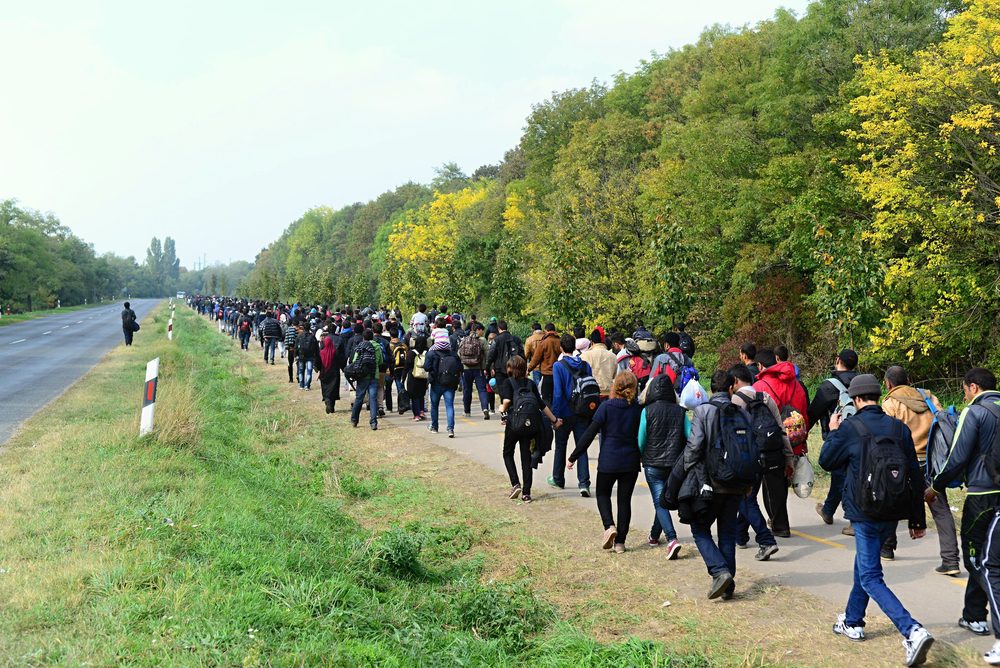
Two prominent members of the German Social Democrats (SPD) are speaking out against their own party leadership over the issue of illegal immigration, calling for the government led by Chancellor Olaf Scholz, also a member of the SPD, to tighten the country’s asylum policy.
Thuringia’s Interior Minister Georg Maier has called on Chancellor Scholz and the German federal government to reduce the number of asylum seekers by declaring more countries as safe countries of origin, specifically mentioning the North African region known as the Maghreb, Der Spiegel reports.
“We have to reduce the number of people who come to us,” Maier said and added, “We should increase the number of safe countries of origin. For me, the Maghreb states are one of them.”
Deputy leader of the SPD parliamentary group Dirk Wiese also wants to see more countries declared as safe so that those who are unlikely to receive a positive asylum decision will not come to Germany in the first place and tie up resources in the asylum system.
Interior Minister Maier admitted that asylum policy was becoming the biggest issue in eastern Germany, which faces elections in Saxony, Brandenburg, and Thuringia next year, all regions where the populist conservative Alternative für Deutschland (AfD), known for their anti-mass migration policies, have strong support in the polls.
In July, an opinion poll in Thuringia put the AfD well in the lead at 32% in the polls, ten points ahead of the far-left Die Linke and 22 points ahead of the SPD, which polled at just 10%.
In Brandenburg, where the SPD has far more support, the AfD are again in the lead according to a poll released in August that put the party at 28.5%, nearly double their 2019 election result of 15.9%.
“There is a great deal of dissatisfaction with the German government’s refugee policy, which is not entirely unfounded,” Maier told Der Spiegel and noted that refugees cost municipalities in Thuringia an additional €50 million saying, “That’s money that’s missing elsewhere.”
Chancellor Sholz may be facing more than just criticism from within his own party as the Free Democrats (FDP), a member of the ruling government coalition with the SPD and the Greens, have also expressed support for declaring more countries as safe countries of origin.
Finance Minister Christian Lindner, the leader of the FDP, said he wants more states to be declared safe in order to help facilitate more deportations of illegals and failed asylum seekers.
FDP parliamentary group leader Christian Dürr added, “I think it would be right to discuss the Maghreb states as well,” echoing the statements from SDP deputy leader Wiese.
However, the one party that remains an obstacle to a tougher asylum policy is the Greens, as Foreign Minister Annalena Baerbock rejected calls to expand the list of safe countries saying, “For domestic policy reasons, I think it is a daring approach to proceed with a lawnmower in foreign policy.”
Over the last year, Germany has seen a surge in asylum applications, with a report from last week from the Federal Office for Migration and Refugees (BAMF) claiming that since the start of the year, Germany has seen 204,461 asylum applications, a figure 77.2% higher than the same period in 2022, which itself saw the largest number of applications since 2016.
Last year’s figures did not include Ukrainian refugees fleeing their country’s conflict with Russia, which some have estimated to be as many as 1.1 million people.
As the war continues, Ukrainians will be allowed to remain in the European Union under a special protection status until March of next year but a July report from Euractiv suggests as many as half of them wish to remain in Germany long-term.
The mass arrival of Ukrainian refugees and high numbers of asylum seekers from elsewhere has put great strains on Germany’s ability to house and care for the new arrivals, as many municipalities have reported running out of accommodations entirely.
A possible U-turn on asylum by the SPD would not be a first for a social democratic party in Europe. In Denmark, the Social Democrats are known as one of the toughest on asylum and mass migration within the entire European Union.
Danish Prime Minister Mette Frederiksen is known for her anti-mass migration stance, touting a “zero refugee” policy which helped her lead her party to victory in last November’s national elections.
